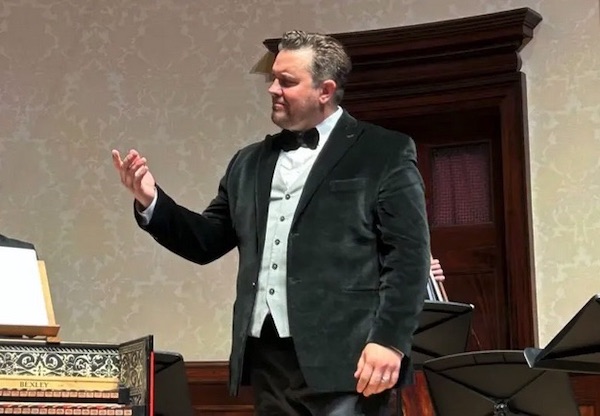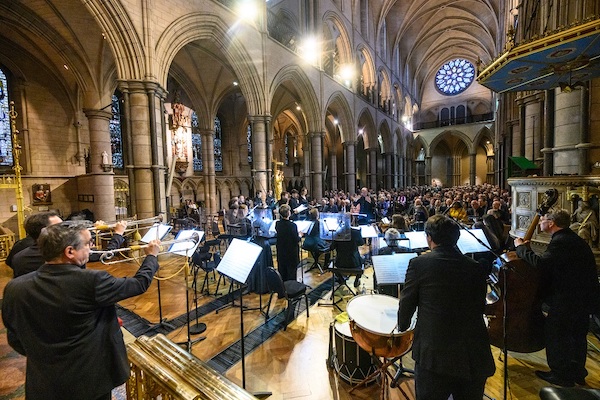Amanda Forsythe (Éolie) and Karina Gauvin (Circé) in Henri Desmarest's Circé, centerpiece opera of the Boston Early Music Festival (seen 11 June 2023). Photo credit: Kathy Wittman. Image source: BEMF.org
My partner and I have just returned from a monthlong trip to London and Boston, and I thought I'd offer a report on some of the musical performances we attended. In chronological order:
LONDON
Michael Spyres with Il Pomo d'Oro conducted by Francesco Corti: "Tenore Assoluto," Wigmore Hall, 21 May 2023
Michael Spyres at Wigmore Hall, 21 May 2023. Image source: Conessi all'Opera
Italian operas in the 1700s were dominated by the castrati, men with voices in the soprano or alto range. Tenors were often entirely absent, or relegated to minor roles. But for this program, drawn from his recent album Contra-Tenor, Michael Spyres uncovered bravura tenor arias from operas by major Baroque composers such as Handel, Vivaldi, Porpora and Hasse, as well as by some lesser-known figures such as Galuppi, Latilla, Sarro, and Mazzoni. His accompanists were the virtuoso period-instrument chamber orchestra Il Pomo d'Oro led by harpsichordist Francesco Corti.
Spyres' voice is astonishing. He calls himself a "baritenor," and indeed has a remarkably wide range; he also has the vocal flexibility to execute rapid coloratura passages. But this concert, in which Spyres sang one fiery vocal showpiece after another, was almost too much of a good thing. For me the highlight of the evening was Spyres' first encore, "J'ai perdu mon Eurydice" (I have lost my Eurydice) from Christoph Willibald Gluck's Orphée et Eurydice (1774), his French-language adaptation of Orfeo ed Euridice (1762). For this listener Spyres' moving and lyrical performance of this aria provided a grateful respite from the spectacular fireworks that preceded it.
https://www.youtube.com/watch?v=sDzaD6IojIs
Lay Vicars of Westminster Abbey, First Evensong of Trinity Sunday, Westminster Abbey, 3 June 2023
The quire of Westminster Abbey looking west towards the quire screen and the nave beyond. We were seated in the back row of the right-hand stalls in the section nearest the screen but within a few feet of the choir stalls in the center. Image source: Westminster Abbey
The twelve male Lay Vicars of the Westminster Abbey Choir performed the music for this Evensong service, which we chose because of the composers represented: Hildegard of Bingen, William Byrd, Tomás Luis de Victoria, and Ivo Vento.
It was a privilege to hear this glorious Medieval and Renaissance music in this stunning Gothic cathedral in the context of a service. The Lay Vicars were split, with six singers on our side of the quire and six opposite. Aided by the reverberation of the vast cathedral, their sound was surprisingly full and rich, and "Laus trinitate" in particular was awe-inspiring. (We heard both a rehearsal of this work while we were waiting to enter the quire, and its performance during the service.)
Hildegard of Bingen, "Laus trinitati," performed at the Abbaye de Silvacane, Provence, France:
https://www.youtube.com/watch?v=fzT0VJ9bZcs
Le Concert Spirituel conducted by Hervé Niquet: George Frideric Handel, Dettingen Te Deum and Coronation Anthems, St. James's Catholic Church, 6 June 2023
Le Concert Spirituel and Hervé Niquet at St. James's Roman Catholic Church, 6 June 2023. Photo credit: Matt Crossick/PA Wire
This concert was definitely an Event. It opened with a fanfare followed by baritone Roderick Williams singing "God Save the King," in honor of the special guest sitting in the front row, King Charles III. The Dettingen Te Deum and the four Coronation Anthems are monumental Baroque, featuring trumpets, drums, and massed choruses. Conductor Hervé Niquet varied the dynamics, especially in the fourth Coronation Anthem "Zadok the Priest," which had a softer entrance of the full instrumental and vocal forces than is usually heard, building to full volume (and pounding tympani) on the final choruses of "God save the King! Long live the King!" BBC Radio 3 recorded the full concert, and it is available for listening through Thursday 6 July.
The opening of Dettingen Te Deum ("We praise thee, O God") performed by Hervé Niquet and Le Concert Spirituel:
https://www.youtube.com/watch?v=9TQAZMytckU
BOSTON EARLY MUSIC FESTIVAL
Stile Antico, "Breaking the Habit: Music for and by Renaissance Women," Emmanuel Episcopal Church, 9 June 2023
Stile Antico at Emmanuel Church, 2023-06-09. Image source: Twitter.com @stileantico
The theme of this year's Boston Early Music Festival was "A Celebration of Women," and in this program the a cappella vocal group Stile Antico performed music composed by, commissioned by, written for, or referring to Renaissance women.
Whatever the rationale for its inclusion, the music was performed with both astonishing precision and great beauty. The program introduced us to many composers we'd not heard before, including the nuns Raffaella Alleotti, Sulpitia Cesis, and Leonora d’Este; the Habsburg regent Margaret of Austria; and the madrigalist Maddalena Casulana, who wrote and published music "to show to the world the foolish error of men who so greatly believe themselves to be the [sole] masters of high intellect gifts that these gifts cannot, it seems to them, be equally common among women." The concert was also well-structured, with different members of Stile Antico stepping forward to give brief spoken introductions to each grouping of works, and so preventing us all from floating away on the waves of gorgeous polyphony.
Stile Antico performing William Byrd's "O Lord, make thy servant Elizabeth":
https://youtu.be/B2BCl4Slqls?t=97
Francesca Caccini: La liberazione di Ruggiero dall’isola d’Alcina (The liberation of Ruggiero from Alcina’s island, 1625). Mireille Lebel (Alcina), Colin Balzer (Ruggiero), Cecilia Duarte (Melissa), other soloists and chorus with the BEMF Chamber Orchestra, Paul O'Dette and Stephen Stubbs, directors, New England Conservatory Jordan Hall, 10 June 2023
Colin Balzer (Ruggiero) and Mireille Lebel (Alcina) in Francesca Caccini's Alcina, NEC Jordan Hall, 10 June 2023. Photo credit: Kathy Wittman. Image source: BEMF.org
Francesca Caccini's Alcina is the first known opera composed by a woman, and it's remarkable that its music still exists (most of the rest of Francesca's many works are lost). Francesca was not only a composer but a multi-instrumentalist and a singer, who at age 13 probably made her public singing debut in Jacopo Peri's Euridice (1600)—the first (surviving) opera.
The story of Alcina is taken by librettist Ferdinando Saracinelli from Ludovico Ariosto's Orlando Furioso (1532), the same source used more than a century later for Handel's opera Alcina (1735). The knightly hero Ruggiero has been seduced by the beautiful sorceress Alcina into tarrying with her on her magic island in a haze of sensual pleasure. The sorceress Melissa, in male disguise, arrives and tries to recall Ruggiero to a sense of his martial duties. Ultimately Melissa prevails, and Alcina's enchantments of Ruggiero, and of her numerous former lovers who have been turned into the lush vegetation of her island, are broken.
Alcina was cast from strength (most of the performers also sang the next day in the centerpiece opera Circé) and benefited from longtime BEMF stage director Gilbert Blin's intelligent staging, choreographer Melinda Sullivan's expressive movement, and designer Anna Watkins' effective costumes (particularly striking when the chorus, portraying the enchanted former lovers, was decked out with leaves and branches).
If you have an interest in Monteverdi's operas or other vocal works from the first half of the 17th century, the sound-world of Alcina will not be unfamiliar. Let's hope that a BEMF recording is in the pipeline; Huelgas Ensemble's recording was one of my Favorites of 2020, and the BEMF performers offer every promise of surpassing it. For more on Alcina, please see my review of Magnificat's 2009 puppet-opera performance.
An excerpt from Act II of the 2018 BEMF production in which Melissa brings Ruggiero to recommit to his knightly purpose:
https://www.youtube.com/watch?v=ztjuPzFryk8
Henri Desmarest: Circé (1694). Karina Gauvin (Circé), Aaron Sheehan (Ulisse), Teresa Wakim (Astérie), Jesse Blumberg (Elphenor), Amanda Forsythe (Éolie), Douglas Williams (Polite), other soloists, chorus, and the BEMF Dance Company, accompanied by the BEMF Orchestra, Paul O'Dette
and Stephen Stubbs, directors. Emerson Cutler Majestic Theatre, 11 June 2023
Circé at the Emerson Cutler Majestic Theatre (seen 11 June 2023). Photo credit: Kathy Wittman. Image source: BEMF.org
Another magic island, another sorceress, and another waylaid hero. Circé's libretto (or livret) by Louise-Geneviève Gillot de Saintonge is based on an episode from Book Ten of Homer's Odyssey. Sailing home from the Trojan War, Ulysses and a handful of surviving men, "worn out and sick at heart" (in Robert Fitzgerald's translation) seek respite on the island of the goddess Circe. In Gillot de Saintonge's retelling, Circé falls in love with Ulisse and turns his men into swine to prevent him from leaving the island and continuing home. Ulisse convinces Circé that he returns her love, and persuades her to restore his men to human form. But Circé learns that Ulisse really loves Éolie, daughter of the wind god Éole, and sends demons to attack her. Protected by the gods' messenger Mercure, Éolie frees Ulisse and escapes the island with him and his men; in rage and sorrow, Circé destroys her island's anchorage, forever isolating her from the human world.
Circé was a spectacular triumph for the BEMF performers and production team. French Baroque operas involve a rich instrumental palette, multiple dance interludes, and a large role for the chorus. Circé was a hugely ambitious undertaking, and the BEMF forces rose to the challenge superbly. Every element—the outstanding cast, the large orchestra (directed by Paul O'Dette and Stephen Stubbs and led by concertmaster Robert Mealy), the staging (directed by Gilbert Blin), the dances (choreographed by Marie-Nathalie Lacoursière and Pierre-François Dollé and directed by Melinda Sullivan), the sets (designed by the apparently indefatigable Blin), the lighting (designed by Kelly Martin), and the lavish costumes (designed by Jérôme Kaplan)—combined to stunning effect.
You can experience the musical riches of this work in the just-released BEMF recording, which features the lush-voiced Lucille Richardot as Circé. Richardot was originally scheduled to portray the goddess in the staged opera, but a family health emergency prevented her from doing so. It is a testament to the deep relationships Kathleen Fay has forged over 36 years as BEMF's director that the acclaimed Canadian soprano Karina Gauvin generously agreed to step in and take on the role in the Festival performances.
From the BEMF recording, a taste of Circé's exquisite music: Acte Troisième, Scène Troisième, “Prélude pour le Sommeil—Ah! que le sommeil est charmant” (Prelude to sleep—Ah! How pleasant is sleep). Performed by Kyle Stegall (Un Songe agréable), Jason McStoots (Phantase), and Michael Galvin (Phaebetor) with the BEMF Orchestra & Chorus directed by Paul O’Dette and Stephen Stubbs:
https://www.youtube.com/watch?v=hdxXZFDIhyI


















